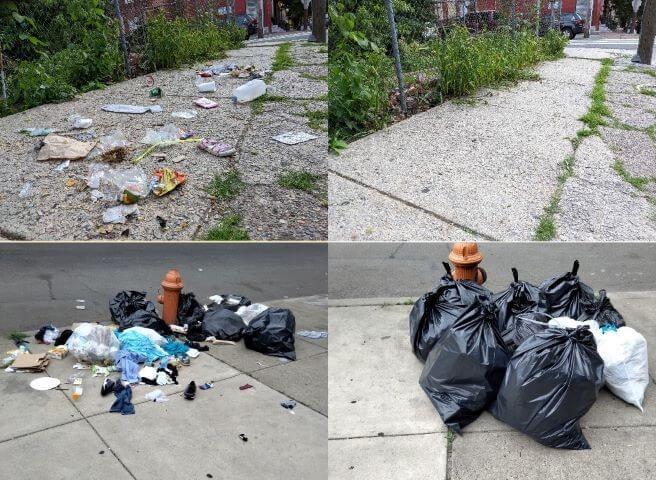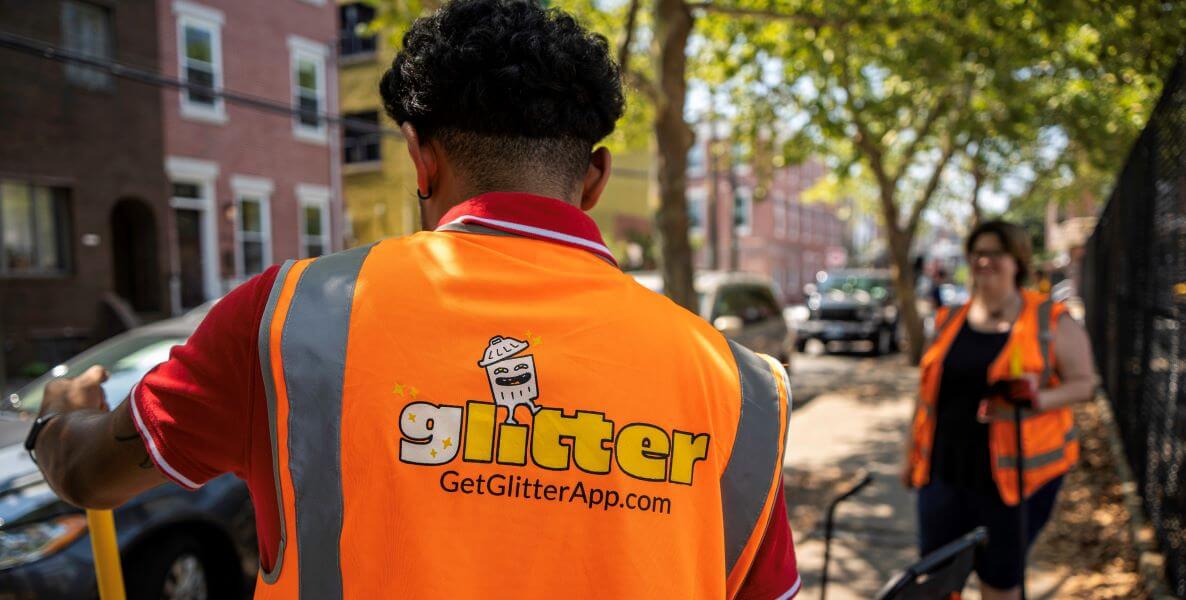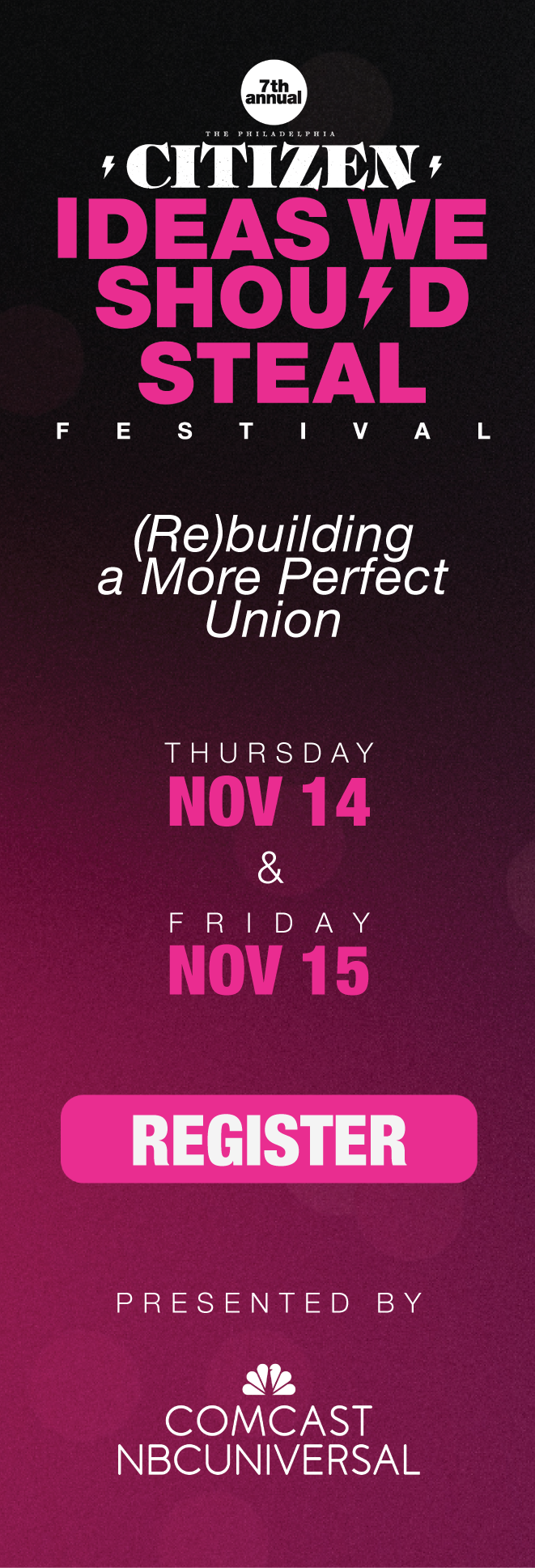In 2019, Philadelphia released its official Litter Index, according to which the City was home to at least 10,000 blocks with moderate to severe litter conditions. Most of those blocks were in our most impoverished neighborhoods. That same year, Morgan Berman was busy founding Glitter, a street cleaning startup designed to facilitate paid cleanups on blocks that slip through the cracks of the City’s waste management services. With the help of Councilperson Mark Squilla, Berman secured a funding boost in the FY2020 budget, only for the City to pull out of executing the contract, claiming it did not want to fund an “unproven pilot.”
At the time, funding Glitter may have seemed unnecessary to Philly’s municipal leaders. After all, Mayor Kenney had convened a sophisticated Zero Waste and Litter Cabinet to tackle problems like litter reduction citywide. But then we were all blindsided by Covid. Facing severe budget constraints, Kenney dissolved the Cabinet. The Streets Department experienced major staffing shortages, causing delays in normal trash collection. The litter did not relent, and a pandemic-fatigued public grew increasingly frustrated with the state of our streets.
But if the litter didn’t relent, neither did Berman. Instead of throwing up her arms in frustration, she brought on Brandon Pousley, a Harvard Graduate School of Education alumnus with nonprofit and corporate consulting experience, as a CEO. They got to work revising Glitter’s business model, devising a crowdfunded, monthly subscription program they believed could overcome the lack of institutional support. They began hiring cleaners, recruiting subscribers, and forming partnerships with community leaders and elected officials around the city.
TLDR: it worked.
From unproven pilot to undeniable success
Don’t take my word for it. Take it from the cleaners who work for Glitter, residents who pay for weekly block cleanings, and community leaders who’ve formed ambitious partnerships with the company.
Justin Walker is a Glitter cleaner assigned to eight blocks in Germantown and Mt. Airy. He loves living in a “beautiful and historic” section of the city, but had grown frustrated with its “egregious litter problem.” So, for the past few years, when he wasn’t working full-time at a cricket club, he picked up litter in his community. Then, he started wondering if he could find a way to be paid for his efforts. Soon enough, he read about Glitter, applied, and, within a few weeks, was hired.
“When I see how filthy this city is compared to other American cities, it breaks my heart. We should be the envy of the East Coast. This is the birthplace of this nation, with more history and culture than most cities combined. It deserves to have clean streets to reflect its glory and significance,” says Justin Walker.
Working as a street cleaner isn’t glamorous, but Walker says it’s “not difficult either.” Glitter even accommodated his transportation needs: “I don’t drive, so they helped me find blocks close to home, and I can just walk, clean them and walk home.”
He likes getting paid for work he already did and receiving appreciation from neighbors. “Local residents will see you working, be intrigued, and start asking questions about the company and thanking you for what you do,” he says.
Faeshon Boyer is another Glitter cleaner who’s assigned to 10 blocks in West Philly. Boyer was unemployed when she heard about the company on the news. It piqued her curiosity, and within days she was talking to Pousley. “The more I learned about how many layers of issues can be reduced by the efforts of Glitter alone, I was honored to become a part of the team,” she says.
Boyer has been overwhelmed by the positive response. Neighbors give her water, open their homes to her if she needs a break from the heat, and occasionally treat her to coffee. “Many people thank God that someone finally cares enough to help with the litter problem in the city.”
The most gratifying part of the experience is the impact her work makes on children. “They follow me down the street sometimes and ask me questions about cleaning up,” she says. As the volume of litter shrinks week by week, Boyer says that the community has become more active, “planning events for the children on the block” and “sitting outside talking to one another. Children laughing and playing: I haven’t seen that in a long time.”
People who clean for Glitter love Glitter. People who pay for Glitter love Glitter. People who live or own businesses on streets cleaned by Glitter love Glitter.
Walker and Boyer say Glitter’s leadership team is accessible and attentive to their needs. Neither had any reservations about recommending the job to anyone looking for rewarding, living wage employment with flexible hours.
Glitter’s subscribers — Philadelphia residents and businesses who pay a monthly fee for weekly cleanings on their block — are similarly pleased. Joe Matje, an engineer who’s lived in Passyunk Square for 12 years, has spent many of those years devoting free time to picking up litter with neighbors. He too is fed up with the condition of Philly’s streets. “I cannot overstate how much this litter issue makes an impression on folks visiting and doing business in our city,” he says.
Then, he too read about Glitter.
“Glitter is focused on the same issue we are,” he says, “I believe in their business model of putting people to work cleaning up litter in this city.” Since becoming a subscriber, Matje has helped recruit five more households on his block to split the $200 monthly cost of weekly cleanings on their block. It’s proven to be a good investment. “There is a noticeable difference in how clean the neighborhood is,” he said, adding that a monthly subscription “is worth the cost to keep litter off the streets.”

Matje believes Glitter “can provide the litter cleaning service that the City is not willing to provide.” He recommends that other city residents who live on blocks plagued with litter subscribe, and believes the City of Philadelphia should provide financial support to Glitter.
This summer, Glitter formed partnerships with anti-gun violence champion State Senator Art Haywood and the West Philadelphia Corridor Collaborative (WPCC).
Glitter’s role in both partnerships is to facilitate weekly cleanings on blocks with high rates of violent crime. The geographical overlap between gun violence and litter in Philadelphia is striking: numerous studies have shown close correlations between crime and litter: Cleaner, greener city streets have lower rates of violent crime
Senator Haywood’s office, in collaboration with community leaders in Germantown and Mt. Airy, selected eight blocks with for Glitter to clean in 2021. Walker has been cleaning these blocks every week since June. Haywood went to meet him in person on the morning of his first cleanup, “was very impressed with [Walker’s] dedication.” The senator has kept a close eye on those blocks over the past two months.
“After the first week of my office’s partnership with Glitter, the amount of trash in Northwest Philadelphia dropped significantly,” says Haywood. That’s one improvement; another is lifted spirits among block captains and neighbors. Haywood hopes his experience “inspires elected officials and community leaders in the area to form similar partnerships.”

The WPCC, which represents over 2,000 businesses in West Philly, similarly teamed up with Glitter in June to help reduce gun violence. Aware of the close correlation between crime and trash, WPCC President Jabari Jones used their own funds, including some from a private partnership with PhillySafe, to pay for Glitter services.
Soon, Boyr was hard at work cleaning 10 of the 12 blocks that the WPCC selected. Jones, like Haywood, quickly saw significeant reductions in litter.
While it’s too early to measure the impact of these partnerships on gun violence, Both Haywood and Jones are so pleased with Glitter’s services that they’ve already begun looking for ways to expand their scope. Haywood agreed to fund additional cleanings on blocks adjacent to the original eight, and Jones is hoping to add blocks in commercial corridors.
Full circle … almost
People who clean for Glitter love Glitter. People who pay for Glitter love Glitter. People who live or own businesses on streets cleaned by Glitter love Glitter. The company has cleaners assigned to blocks in every section of the city: 110 and growing by the week.
The only remaining question seems to be: Are leaders in City government willing to support Glitter? As of last month, the answer seems to be: yes.
The most common complaint Berman and Pousley receive from subscribers is that the City’s normal trash collection service leaves behind a mess that partially undoes Glitter’s progress.
On July 11, Glitter launched a pilot partnership with the Streets Department intended to maximize its litter reduction capacity on the blocks Glitter services. By far, the most common complaint Berman and Pousley receive from subscribers is that the City’s normal trash collection service leaves behind a mess that partially undoes Glitter’s progress.
In other words, Philly streets are often dirtiest after trash day. Residents who pay both taxes for garbage collection and a monthly fee for Glitter cleanups feel twice the frustration. So, Berman and Pousley started brainstorming. What if, they wondered, we had our cleaners come by immediately after the City’s trucks come by, and then the Streets Department sends a truck back around at the end of the day to pick up the bags our cleaners leave behind?

It seemed like a long shot, but it was their only viable option. So, they called up Squilla, who got them a meeting with Deputy Commissioner of Sanitation Keith Warren. The hail Mary worked. There have been a few road bumps since the collaboration began, but, Pousley says Streets leadership has “been responsive to optimizing collection routes” and their crews “have caught up on any missed pickups.” Now, the plan is running smoothly and “positively impacting over 30 percent of [Glitter’s] blocks.”
A Streets Department spokesperson says of the partnership, “collaboration between government and citizens helps to achieve a cleaner, greener, and safer city.” Squilla, who sees “Glitter as a long-term partner” capable of leveraging public and private resources to “make our city cleaner,” recently “secured budgetary funding for this type of project” in FY2023.
Glitter cleaner Walker will toast to that. “I truly love this city, born and raised, and I couldn’t dream of living anywhere else. When I see how filthy this city is compared to other American cities, it breaks my heart. We should be the envy of the East Coast. This is the birthplace of this nation, with more history and culture than most cities combined. It deserves to have clean streets to reflect its glory and significance,” he says.
By now, Glitter is a proven litter reducer, an established partner in holistic gun violence reduction efforts — not to mention a woman-owned business that provides living wage jobs to underemployed Philadelphians. Berman and Pousley have created a viable, innovative street cleaning service in a city that’s suffering now more than ever from dirty, unsafe public spaces. And, so far, they’ve done it all without institutional support from the City.
Time to open up the coffers.
Correction: A previous version of this story misstated the West Philadelphia Corridor Collaborative was using a City-funded Safe Corridors Grant to help fund Glitter services.
![]() RELATED
RELATED




